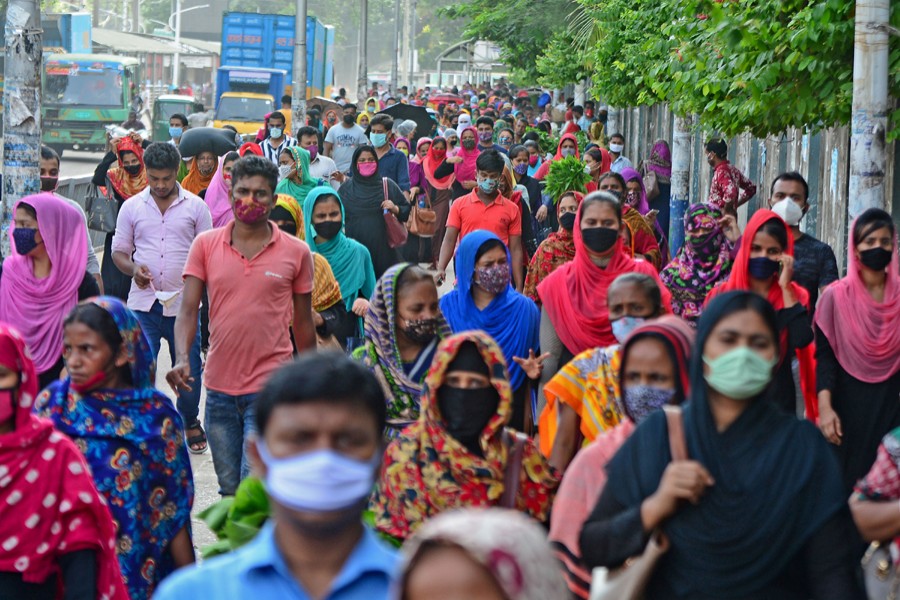Covid-19 seroprevalence or antibody response is higher among slum-dwellers than non-slum people, according to a new ICDDR, B study.
The report of the study, released by the International Centre for Diarrhoeal Disease Research, Bangladesh (ICDDR, B) on Tuesday, said the antibody detection rate was 72 per cent in slum areas.
The percentage was 62 among non-slum residents.
Covid-19 antibody has been detected among 71 per cent people tested in Dhaka and 55 per cent in Chattogram.
The seropositivity detection rate was 70.6 per cent among women that was higher than men (66 per cent), said the research report.
ICDDR, B scientists presented the findings of the study styled 'Driving Factors of Covid-19 in Slums and Non-slum Areas of Dhaka and Chattogram' during a webinar on Monday.
ICDDR, B executive director Dr Tahmeed Ahmed joined the webinar as the chief guest while senior scientist and principal investigator Dr Rubhana Raqib presented the key findings.
Chair of the executive advisory committee to the study Prof Dr Mahmudur Rahman and BHW adviser Yasmin H Ahmed, among others, also spoke.
The research team collected data between October 2020 and February 2021 through surveying 3,220 people in five slums and non-slum areas in two cities.

Some 35.5 per cent of 2,209 people, who were found infected, showed mild symptoms. The infection rates were 72 per cent among slum-dwellers and 62 per cent among non-slum residents, Dr Raqib said.
"Many of us mistakenly believe the poor fall less sick compared to the rich," she said, adding that it was actually a wrong notion.
Moderate physical activity positively impact protection from Covid-19 infection while those who practise preventive measures like use of mask and hand wash had lower risks of seropositivity, Dr Raqib cited.
According to researchers, this study results give an idea about the extent of infection in some specific regions for a certain period, which is not applicable to other instances.
Citing the findings very encouraging, ICDDR, B senior scientist Dr Firdausi Qadri said people have mounting antibodies but everybody is not mounting the same level of antibodies needed for protection.
"So, vaccination is very important. We must continue the nationwide inoculation activity as it will give us the much-needed protection," she added.
According to epidemiologist Dr Rahman, it should not be the right thing to say that corona virus is a disease for the rich only, given the findings of the study.
Probably, symptoms of many Covid-infected people were not exposed and a majority of slum-dwellers is working people, and a very little number of older people live there, he observed.
"Now, coronavirus keeps transmitting in remote areas, infecting village people and its pattern keeps changing by the day," Dr Rahman said.
He highlighted the importance of wearing masks, washing hands and maintaining distance to avoid being infected.
"Mask doesn't care what variant is going through. Mask is capable of preventing all types of variants. So, this is the best protection."
Dr Tahmeed said a person must go for Covid-19 test when he or she shows the symptoms like fever, cough and breathing problems.
He recognised the need for increasing physical activity, wearing masks and maintaining social distance in a bid to prevent the disease.
Overweight or obesity enhances the risk of falling prey to the viral disease, he said, adding: "We need to increase our activities."
The report also found higher level of vitamin-D deficiency among those surveyed (85 per cent), but the researchers did not find any correlation between Covid-19 and deficiency.
[email protected] and [email protected]


